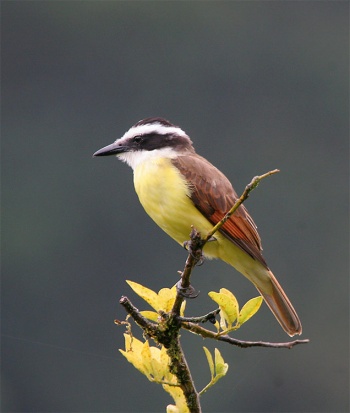m |
m |
||
| Line 8: | Line 8: | ||
==Identification== | ==Identification== | ||
Easily mistaken with the [[Boat-billed Flycatcher]] (''Megarynchus pitangua''), due to size and colours. They are separated by: | Easily mistaken with the [[Boat-billed Flycatcher]] (''Megarynchus pitangua''), due to size and colours. They are separated by: | ||
| + | |||
* Bill, which is much broader and with a strongly curved culmen in the Boat-billed Flycatcher. | * Bill, which is much broader and with a strongly curved culmen in the Boat-billed Flycatcher. | ||
* Wings, which are rufous in Great Kiskadee (''see photo'') and olive in Boat-billed Flycatcher (careful; juv. Boat-billed with rufescent to wings). | * Wings, which are rufous in Great Kiskadee (''see photo'') and olive in Boat-billed Flycatcher (careful; juv. Boat-billed with rufescent to wings). | ||
| − | |||
Can be mistaken with smaller-sized similar coloured flycatcher as well, e.g. [[Rusty-margined Flycatcher|Rusty-margined]] (''Myiozetetes cayanensis'') and [[Social Flycatcher]]s (''Myiozetetes similis'') and [[Lesser Kiskadee]] (''Philohydor lictor''), but they are easily separated by size and their noticeably slimmer and/or shorter bills. | Can be mistaken with smaller-sized similar coloured flycatcher as well, e.g. [[Rusty-margined Flycatcher|Rusty-margined]] (''Myiozetetes cayanensis'') and [[Social Flycatcher]]s (''Myiozetetes similis'') and [[Lesser Kiskadee]] (''Philohydor lictor''), but they are easily separated by size and their noticeably slimmer and/or shorter bills. | ||
Revision as of 22:57, 18 May 2007
- Pitangus sulphuratus
Description
A stocky flycatcher with relatively broad black bill, black-and-white striped head, olive-brown back, bright yellow underparts and rufous wings. Its tail conspicuous in flight. Generally also has a yellow crown. It's about 10 1/2" (27 cm) size.
Identification
Easily mistaken with the Boat-billed Flycatcher (Megarynchus pitangua), due to size and colours. They are separated by:
- Bill, which is much broader and with a strongly curved culmen in the Boat-billed Flycatcher.
- Wings, which are rufous in Great Kiskadee (see photo) and olive in Boat-billed Flycatcher (careful; juv. Boat-billed with rufescent to wings).
Can be mistaken with smaller-sized similar coloured flycatcher as well, e.g. Rusty-margined (Myiozetetes cayanensis) and Social Flycatchers (Myiozetetes similis) and Lesser Kiskadee (Philohydor lictor), but they are easily separated by size and their noticeably slimmer and/or shorter bills.
Distribution
Very common and widespread throughout Latin America. In North America, occurs in extreme southern Texas and eastern and western Mexico. In South America, it is absent only in the Pacific coast and in far south.
Habitat
Rivers, streams, and lakes bordered with dense vegetation; also in more open country and in parks in most of its range. Very adaptable to human life in cities.
Voice
Loud, piercing kis-ka-dee, hence its English name. In several other languages, it is called "bem-te-vi" or "bentevi", also because of its call. Also makes an incessant, shrill chattering.
Behaviour
This bird has a noticeably agressive behaviour, pursuing and attacking bigger birds or even snakes. Its diet is omnivorous, consisting of, in addition to insects, small fruits and seeds and even fish, diving straight into the water like a kingfisher, although not as deeply.
Taxonomy
Was initially thought to be shrike of the genus Lanius, but this idea was disgarded many decades ago.




